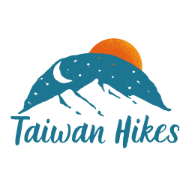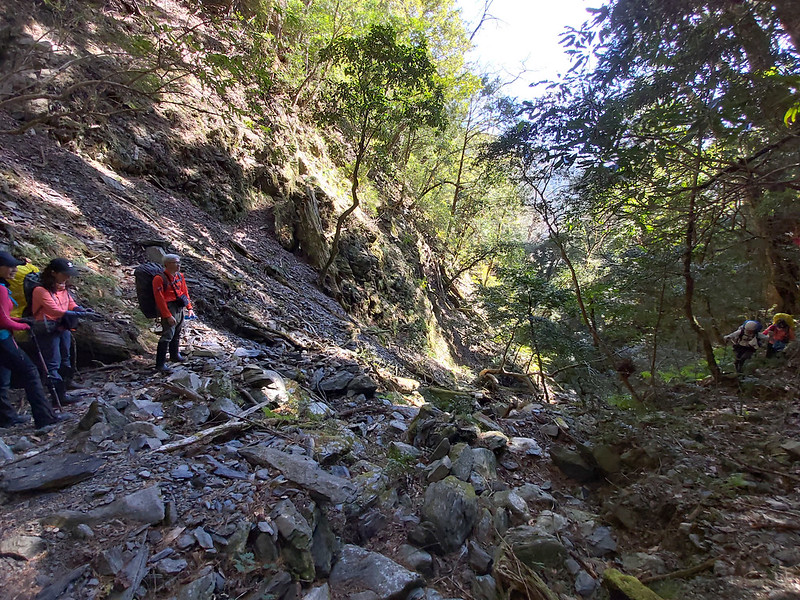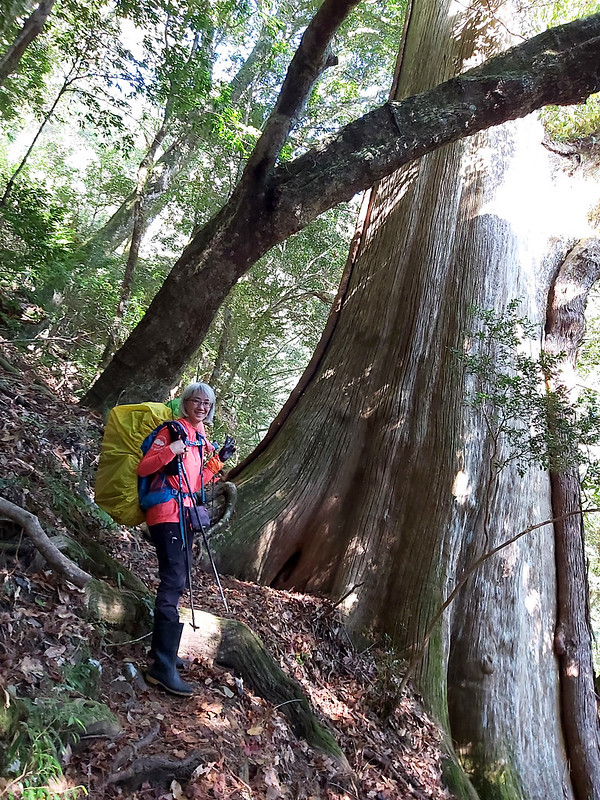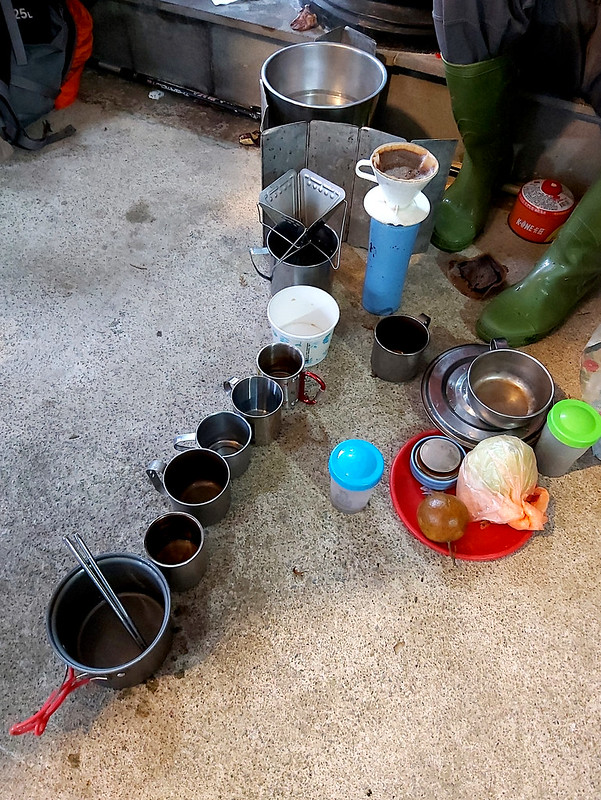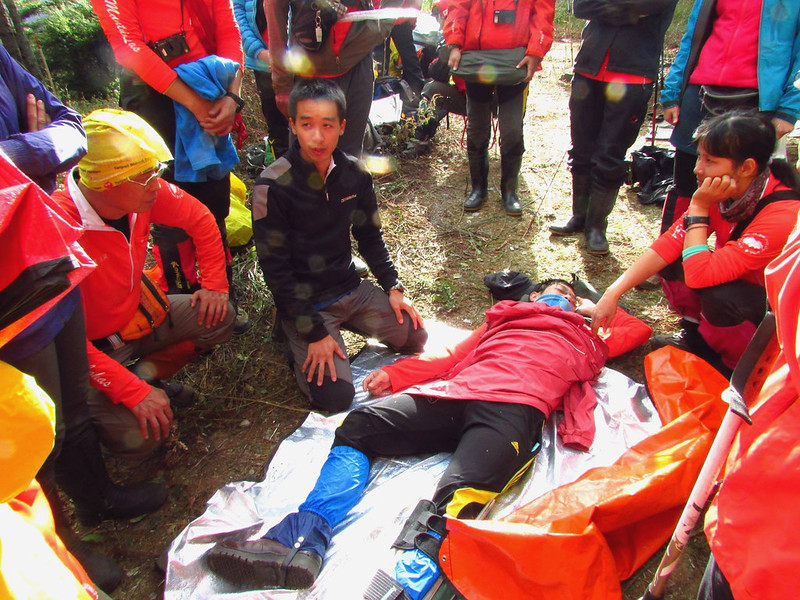4 Ways to Hike in Taiwan with Pros and Cons
It seems easy to hike in Taiwan, and I've met several international
visitors Google their way to the trails, and there are
many great blogs in English
to tell you where you can hike in Taiwan. But there are other
options to enjoy hiking in Taiwan, and here are the pros and cons of
each method.
Before 2001, if you wanted to hike the 100 Peaks, the elevation
greater than 3,000 meters/ 9,842 feet above sea level, people had to
go with licensed high mountain hiking guides and applied with
registered hiking associations (reference, Chinese). During that time, hiking guides were quite well trained
and many of them started hiking since college.
After this regulation was abolished in 2001, hiking with the
associations is not the only option, and there are good and bad
outcomes with the abolishment of this regulation. Sports
Administration Ministry of Education in Taiwan has issued
a new regulation
to regulate qualifications of the mountain activity guides. Most
hiking associations also establish their own training
to build up their guide teams.
1. Go with the Hiking Associations
This is the most popular way to hike in Taiwan, and also my main
approach to explore the trails.
Pros
Cost and Hassle-free Guided Hikes
There are so many registered hiking associations in Taiwan, and they
have many well-trained and experienced guides. They have meetings
regularly to decide which trails they are going to hike for the
coming quarters.
Taiwan Mountain LOHAS Association
even requires their guides to check the trails at least once to make
sure the trail condition is suitable before the trips are available,
and some other groups will help clean up the fallen branches or
debris if manageable.
For people who want to hike the 100 Peaks, hikers have to
apply permits to the administrations
the
National Parks of Taiwan
for legal entry and staying at the cabins or campsites, because most
of the 100 Peaks locate in the National Parks. Hikers are not
allowed to go there without applying and do wild camping, either.
The main purpose is to prevent the vegetation and wildlife from too
many human activities and forest fire. There are designated areas
for hikers to use gas canisters to cook. For the popular hiking
destinations, sometimes it can be really difficult to apply,
especially for the local hikers, you have to remember when to apply
in advance, and submit the application materials.
If you decide to hike with the hiking associations for the 100
Peaks, you just sign up, wait for the application results before
paying the cost. If you are lucky enough and get a spot at the
cabin or the campground, those associations will arrange pickups and
decent hotels or B&B and book on-site catering service for your tents, sleeping
sleeping bags and meals depending on what the trips provide.
Safety Is the Biggest Reason to Hike with A Group
Although accidents may still occur even if you hike with a group,
safety is still considered as the main concern why people join the
group hikes. According to
government regulations
(Chinese), qualified hiking guides must receive at least 48 hours of
indoor and outdoor training,
and meet other requirements to become certificated.
Qualified hiking guides not only know how to survive, navigate and
perform first aid in the wilderness, but, most importantly, also
know the trails and potential risks very well to prevent any danger
from happening beforehand. For example, experienced guides know the
trail terrains well so they can warn the hikers when they traverse
that area, or other things like wasp activities, etc. Of course,
there are many unforeseen dangers, like sudden rains or collapsed
slopes, but at least they are well aware of most of the trail
conditions.
Another benefit is most hiking associations will arrange several
guides to assist hikers. One will be the lead guide and she or he
will ask hikers not to go before her or him, and one as the
designated guide to be the last person in the group. They also
arrange several guides in between hikers depending on the size of
the group. If the hikers need any help, they will know who to turn
to. So basically, the hikers will be surrounded by guides to make
sure everyone is there. If something is up or someone is missing,
the guides can react immediately, and they have enough guides to
take care of the rest people.
For some challenging hikes, some hiking associations will screen
people based on their physical assessments and hiking experience to
ensure the hikers can have a good trip. But sometimes there is a gap
between self-assessment and the reality.
I joined a challenging hike in March 2019, and there were three
people who came from other country. They had hiking experience back
home and they were also marathon runners, so they thought hiking in
Taiwan shouldn't be that difficult. It turned out to be a different
story. The trail was muddy with fallen trees, entwined tree roots
and steep slopes. Their running shoes got stuck in the mud all the
time, and they lagged behind a lot and one guy's shoes just gave up
upon him. The female guide kept them company all the time, and our
lead guide even got back on the trail to assist them after he
settled us down at the campsite. They were late from the most of us
for 3 hours, and they had to hike in the dark.
You Get to Hike on Rare and Remote Trails.
There are many easy-access trails in Taiwan, but there are more
trails that we don't know about. With the hiking associations, I've
been to many beautiful trails since 2017. Gradually, I build up
a pocket list of trails
that I'd like to hike again.
Having Hiking Mates to Boost Morale
I personally think one the benefits of hiking with a group is to
have some people there to keep you going. When you hike with a
group, you and your hiking mates will be there to encourage and help
each other. When I hiked on a long difficult trail, the thought of
giving up and turning back came up from time to time, and my pace
would get slower and slower. At this moment, some mental support
from other hikers will help you continue and make it to the summit.
I once hiked on
a high-altitude trail, and the thin air and the lack of proper sleep made the ascending
extremely hard for me. I stopped almost every three steps and had to
rest, and the guide who was in a better condition than I was also
followed my pace. I felt so sorry but very grateful for her patience
and tolerance. It isn't easy to slow your pace just to accommodate
other hikers' need, but I am very lucky to meet those great guides
on the trails. But please also bear in mind that not every guide
will be so patient, and some can even be mad at you, but they still
keep you accompany.
Some guides even share their knowledge about the vegetation, trail
history and how to survive in the woods. Some guides even go beyond
and prepare free trail food or snacks for hikers to enjoy. When you
hike in a cold weather and your guides boil hot water and hand you a
cup of hot drink, it feels like heaven.
Cons
It Might Be Too Crowded on the Trail.
Some hiking associations are very popular, and they welcome anyone
who is interested to join the hike. Usually they will not set up a
quota of how many people can participate for free guided hikes.
Therefore, it can be very crowded and noisy on the trail.
You Might Become the Focus in the Group
Taiwanese people are very friendly, especially older hikers. If you
get to hike with the locals, according to my observations, you
pretty much will get special treatment and care, and other hikers
will help you as much as they can and even provide you trail foods.
They might not speak English fluently, but they are very welcoming.
You might feel like a celebrity because almost everyone wants to
take photos with you.
If you enjoy being around with people, this may not be a problem.
But if you prefer to be left alone, you might think the extra
attention is too much. Of course, this will not happen to each
hiking association, but it's possible. Some of the expat hikers in
Taiwan share their stories with me about their encounters with the
local hikers and some are hilarious.
Most of the Hikes Are on the Weekend.
Those guides from the free guided hikes are not paid and most of
them have full-time jobs. They devote their time to help hikers
enjoy the nature. The only time they are available is on the
weekends, and that's why those free guided hikes you find are mainly
on the weekend. You still can find some free ones during the
weekdays, but those are not common. For those weekday hikes, the
guides are retirees, and some are only open to members.
2. Join Commercial Hiking Groups
Most of those don't have free guided hikes, and they offer
customized hikes, too. However, if you consider a customized trip
with them, please take those mentioned below into consideration
carefully. Although you take the major responsibility of being safe
on the trail, hiking with a qualified and good guide is still
essential to whether you can have a great trip here in Taiwan.
A few of those groups may be registered as companies, but many of
them work like freelancers. Some guides start running their business
and taking clients after hiking for a few years. Therefore, many of
them may not have the qualifications as hiking guides and their
background, experience and training of those guides can be varied.
Technically, those are not legal in Taiwan. According to the
regulations in Taiwan, you must have a travel agency license to run
commercial trips and take clients. Many commercial hiking groups
adopt different approach by working with travel agencies, but this
is a grey area. Others just start taking clients without any license
or certificates.
Pros
They mainly focus on the most popular hiking routes like Mt. Yu or Jiaming Lake.
Hikers often don't have to carry tents and food, because they book on-site catering service or hire porters to carry the essential gear.
Cons
Profit orientation might compromise safety, which means there might be only one guide for a large group.
The ideal guide-to-hiker ratio is 1 to 6 – 8, but following this
ratio also means that the cost will increase. If there is only one
guide, and some of the hikers in the group have issues, the only
guide may not be able to take care of the rest of the group.
Guides don't have proper training or lack of team management skills.
Usually guides are also drivers, which also increases potential
risks during transportation.
Those groups take whoever want to hike without screening hikers' hiking experience and physical conditions.
Although there is still some miss even after screening, some
unexperienced hikers may treat popular hikes like Mt. Yu as
sightseeing, which increases the risks of getting high altitude
sickness and other potential injuries or carry the wrong gear or
wear wrong clothing.
Lack of proper attitudes toward the nature, like LNT (leave no trace principles), and outdoor activities.
Currently there is no regulation to govern these kinds of groups in Taiwan. Therefore, disputes may occur, and it's difficult to file a complaint.
The cost to join those groups vary a lot. They can be very expensive or extremely cheap.
3. Social Media Hiking Groups
Facebook and Line (an instant communication app like WhatsApp) are
very popular in Taiwan. Therefore, it has become a trend to find
hiking mates from those apps to share the hiking cost, and the
hiking mates can be total strangers.
Pros
It's cheaper because hikers don't have to pay for a professional guide.
It's easy to find people to hike the routes and dates you want.
Cons
The biggest concern is safety.
There is no professional guide to assist. The one who starts the
trip will become the lead and she or he will determine the major
things. However, their hiking experience can vary. People without
training or many hiking experiences can be the lead or the person
who is in charge. However, when injuries or even death occur, the
lead and other hiking mates sill have certain liability. It is very
important to understand those liabilities before you join.
Disputes
It's also very important to discuss how to deal with the possible
things or accidents happening before you go, for example, what to do
when the weather is bad, if someone is injured or even dead, etc. In
order to save money, some members will drive their own cars and
others share the cost. However, when the car breaks down or gets
into accident or a traffic ticket, what to do with the rest trip or
the extra cost? For trips held by hiking associations, the lead
guides have the authority to make the decisions agreed upon
beforehand, and they've been trained to deal with emergencies. If
the members of this social media group don't reach consensus in
advance, disputes might occur.
You don't know how fit your hiking mates are.
As a hiker myself, I misjudge my physical condition sometimes, not
to mention that things like sudden illness or lack of proper sleep
do happen. Those things will affect your performance on the trail.
The same things apply to your unknown hiking mates. They might think
they should be okay on the trail, but there's always a gap between
the expectation and the reality. There are always some people who
hike slower. If the physical conditions vary a lot among those
strangers, who should lead the group and who should keep accompany
with the slower ones? Those are things that might be beyond control
if you hike with a bunch of strangers.
4. Solo Hikes
If the trails you choose are like
Xianshan or Elephant Mountain Hiking Trail
or
Xianjiyan Hiking Trail
with very obvious signs and endless stone steps, please feel free to
hike by yourself. Otherwise, please note that doing solo hikes in
Taiwan requires hikers to have certain skills like technical
climbing, navigation, survival skills, and right gear and clothing
if they go for much more challenging hikes like the 100 Peaks.
Even Mid-elevation Mountain Trails 中級山 could catch you off guard
because of the difficult terrains, humidity, weather and jungle-like
vegetation.
Many blogs in Chinese or English
can help you get some ideas about what the trails look like, but
hiking on them is still different from reading blog posts, unless
you have hiked the trails with similar terrains before. According to
regulations, hikers must have navigation gadgets like GPS,
smartphones or other communication devices when they go hiking.
Pros
Freedom and solitude
For people who enjoy the nature and solitude, there is no need to
explain more. If you hike on the weekdays, the trail might be all
yours. There's a famous solo hiker nicknamed Bikini Hiker, and she
spent 2/3 of 2018 on the 100 Peaks before
her unfortunate accident
in early 2019, and
her hiking plans
and gear were so thorough and detailed that probably only very
experienced guides could compete.
Cons
You have to learn many skills like navigation and how to pitch a tent and do a lot of research about the trails and figure out the transportation.
If things happen, it might be difficult to ask for help unless you have a satellite phone. You are on your own, unless you are lucky to have other hikers near you.
It's better to have an experienced hiker as a communicator off the trail.
This person should know your gear, physical condition, trail plans,
food supply, etc., in case that things happen. That person will know
when to call for help and might be able to know your possible
location for the rescue team to find you as soon as possible. This
person is required if you want to apply for the permit to hike the
100 Peaks in Taiwan.
Hiking with the locals: One of the Best Ways to Travel
I joined a hiking trip with a local guide in Norway in 2017. Our
Norwegian guide was professional, friendly and funny, and he knew
the weather and the terrains very well, and could pick up the best
dates for us to enjoy the most beautiful views. He also shared many
local things with us, and that is exactly the point of traveling:
learn new things from the locals. That's why I highly recommend
visitors to hike with the local hiking associations, because you get
to experience the local culture and people, and they know the trail
well enough.
Other Option: Considering A Customized Hiking Trip
If you want to enjoy the freedom but don't want to spend too much
time doing planning or carrying tents and food, I will recommend you
to have a customized trip based on your physical condition, hiking
experience and what you'd like to see in Taiwan. So, you can enjoy
the freedom and hike with qualified guides.
Hiking Is Not A Sightseeing
Last but not least, one thing should be born in mind is hiking
should be labeled as an outdoor sport, not sightseeing, from my
humble opinion. Hiking and sightseeing require different levels of
physical strength, clothing, gear, and knowledge toward the
activities, the nature and risk managements. Besides, hiking
involves greater dangers which might cause injuries or even death.
New Regulations about Hiking on the Way
In 2019, Taiwan government has announced it's going to change the
laws and regulations toward hiking activities and remove the
restrictions of mountain trekking after the death of
Bikini Hiker
, we are not certain how the new regulations will be at this moment,
because it's still in progress. I'll update the new ones when the
government issues them.

Finally, wherever you hike, please do homework and be well-prepared.
